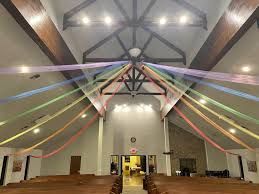As Denominations Shrink They Will Need to Merge
I was a church member and church officer for a long period of my life. In the early decades there was a lot of talk about ecumenicalism. That is, as I recall, a field that advocates common ground among branches of Christianity. I remember a couple of sermons by a young associate preacher in our church who had studied and participated in this goal.
Then some years went by and I never heard ecumenicalism discussed. I don't know why, perhaps it was because rigid religious dogma had moved to front. Anti-gay and anti-abortion became, by a good portion of Christianity, synonymous with the word "Christian." There was no room for accepting any compromises.
Perhaps the cycle is returning toward ecumenicalism. The new term is "inter faith." The University of Utah has a position devoted to the promotion of inter faith discussion. Perhaps the time of rational thinking will arrive when differences in the interpretations of the Bible are not as important as paying the electricity bill. When there is enough money, little differences can be big. When not enough money, theology must take a back seat to reality.
The same principle could apply to preachers serving several churches. Why have a rural Methodist preacher drive 20 miles between two small churches and a Presbyterian serve two churches in the same two towns. Each preacher could have stay in the same town and give two sermons. The ritual and music might be a little different but otherwise who cares.
Inter faith is healthy as it starts an approach to agnosticism. This is a system of belief with says there may be an invisible being somewhere, but we don't know what it is or where it. Disagreeing on fine points in the Bible but working to keep a church open is the first step to a rational belief system.
Rural America could learn from deep in the country's largest city, New York City. I watched an interview with a preacher there who has a day job but moonlights with two volunteer jobs. One is the pastor of a small church. The other is an agency that prepares preachers for life after the ministry. Most of the preachers going through the agency need a secular day job and need to know how to write a resume and interview. They also want to start small churches. Rental space is so expensive the meet in homes or community rooms. All of this requires leaving behind dogmatic and stubborn ideas about one's denomination.




Comments
Post a Comment